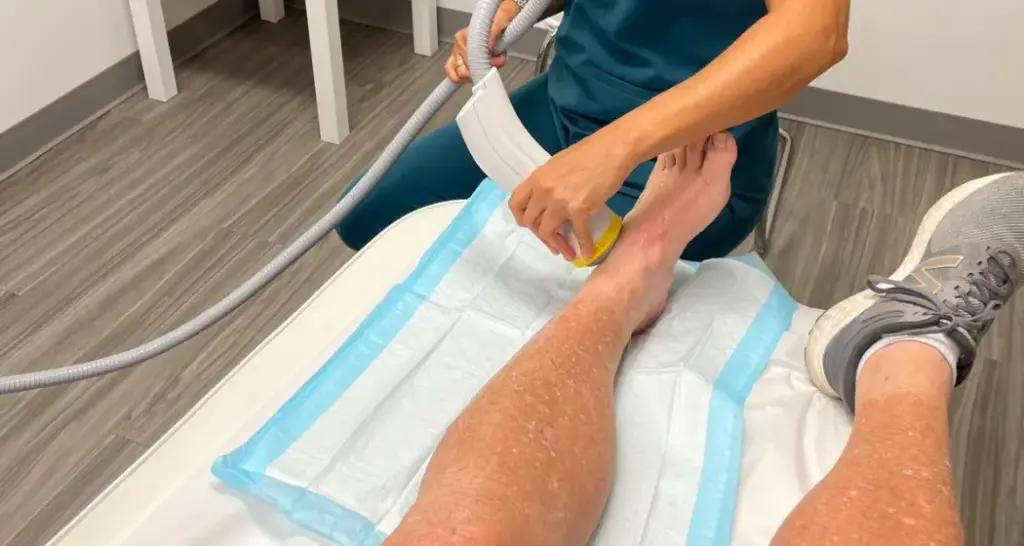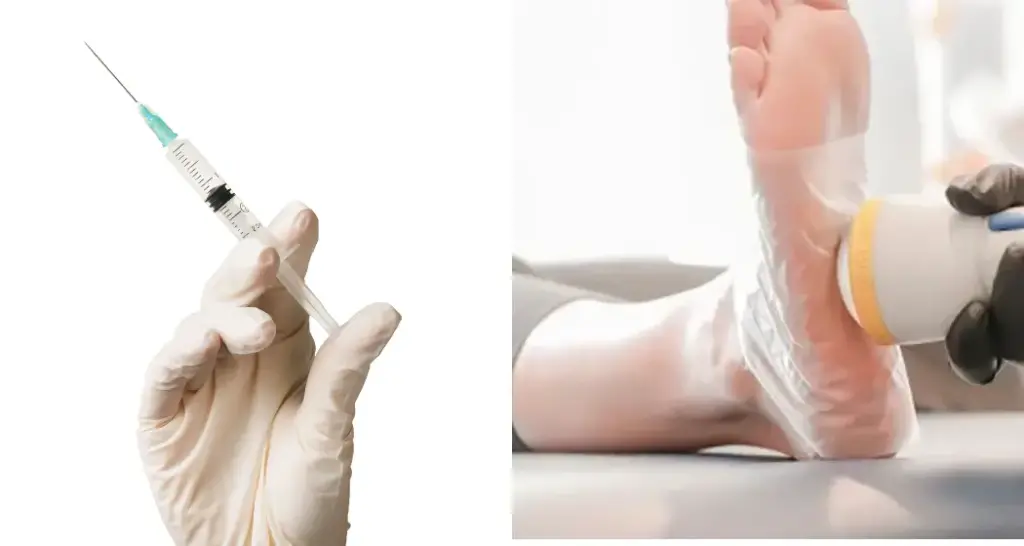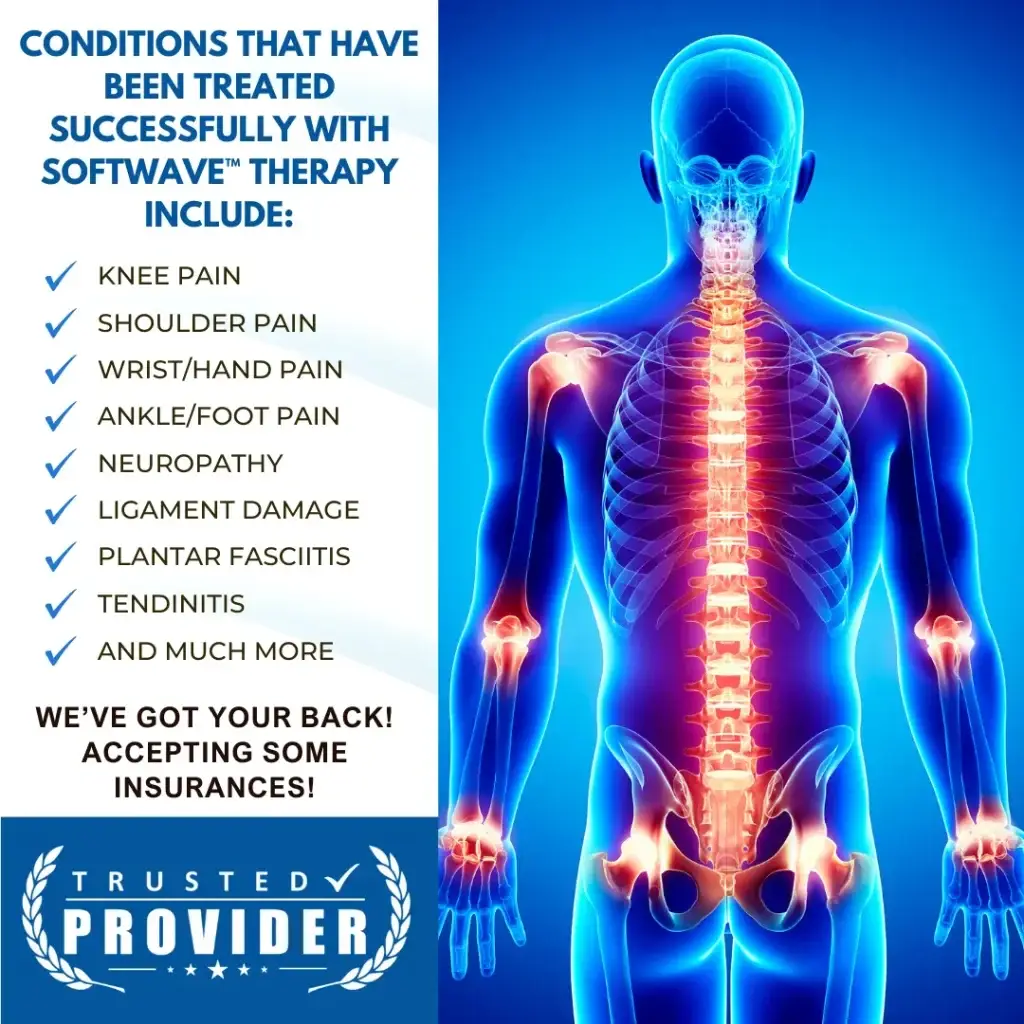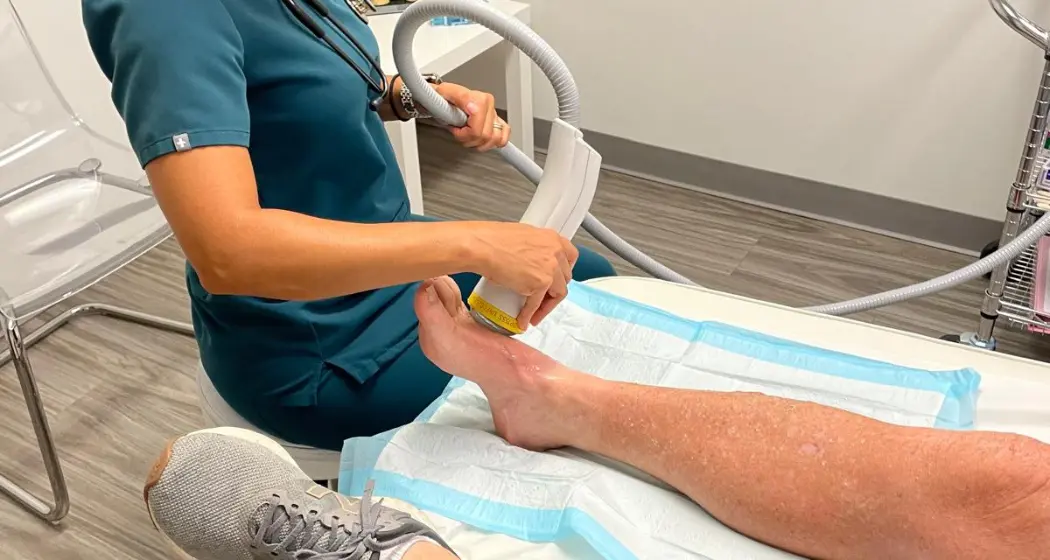How Much Does SoftWave Therapy Cost?
SoftWave therapy, a cutting-edge treatment that harnesses advanced technology to promote healing and pain relief, typically costs between $1,200 and $2,400 for a complete treatment plan of six to twelve sessions. This breaks down to about $250 per session. The exact SoftWave therapy cost and number of sessions needed can differ greatly depending on the specific nature of the injury and the individual’s response to the therapy.

What’s Included in the $49 New Patient Special?
For those new to SoftWave therapy, the $49 New Patient Special offers an excellent introduction. This package includes a comprehensive assessment, a detailed consultation, and one SoftWave therapy session. This allows patients to experience the benefits of SoftWave therapy firsthand and decide if they would like to pursue further treatment.
Is SoftWave Therapy Covered by Insurance?
Currently, SoftWave therapy is being covered by Medicare, as well as some of the other major insurance carriers. However, here at Waters Edge Medical Clinic as a courtesy we verify all patients insurance to find out benefits and coverage.

Finding SoftWave Therapy Near You
If you’re searching for “SoftWave therapy near me” or “SoftWave therapies near me,” there are several clinics and healthcare providers offering this treatment. It’s important to choose a reputable provider with certified practitioners who can tailor the therapy to your specific needs. Here at Waters Edge Medical Clinic we have been using SoftWave therapy to help our patients. Treatments are performed by our licensed professionals.
The Technology Behind SoftWave Therapy
SoftWave therapy utilizes advanced acoustic wave technology to stimulate healing at the cellular level. This non-invasive treatment promotes blood flow, reduces inflammation, and accelerates tissue repair, making it an effective option for various musculoskeletal conditions. Whether you’re dealing with chronic pain, sports injuries, or other ailments, SoftWave therapy offers a promising alternative to traditional treatments.
For more information, consult with a healthcare provider or look for “SoftWave therapy near me” to find local clinics offering this innovative therapy.
SoftWave Therapy: A Cost-Effective Alternative to Surgery, Injections, or Medications
SoftWave therapy stands out as an affordable and effective treatment option compared to more traditional medical interventions like surgery, injections, or long-term medication use. Here’s a detailed comparison to help you understand why SoftWave therapy might be the right choice for you:
Overview
- SoftWave Therapy: Uses advanced acoustic wave technology to stimulate healing and reduce pain non-invasively.
- Injections: Typically involve corticosteroids or other substances injected into the body to reduce inflammation and pain.
- Surgery: Involves invasive procedures to repair or remove damaged tissues or structures within the body.
- Medication: Involves the use of prescription drugs to manage pain and other symptoms over an extended period.
Approximate Lifetime Cost
- SoftWave Therapy: $1,200 to $2,400
- Injections: $15,000 to $100,000
- Surgery: $3,000 to $75,000
- Medication: $15,000 to $70,000
SoftWave therapy is significantly more cost-effective, making it accessible to a broader range of patients.
Treatment Process
- SoftWave Therapy: Non-invasive with no recovery time. Patients can quickly return to their regular routines immediately after the treatment, experiencing minimal to no downtime.
- Injections: Minimally invasive with minimal to no recovery time. However, repeated treatments are often necessary.
- Surgery: Highly invasive with recovery periods ranging from a few weeks to several months, depending on the procedure.
- Medication: Non-invasive with no recovery time but requires consistent use, often leading to dependency and side effects.
Results
- SoftWave Therapy: Long-term results with many patients experiencing sustained relief from pain and improved function.
- Injections: Results vary from temporary to long-term, often requiring repeated treatments.
- Surgery: Generally provides long-term results but comes with significant risks and recovery time.
- Medication: Typically provides temporary relief and requires ongoing use, which can lead to side effects and dependency.
Drug-Free?
- SoftWave Therapy: Yes, completely drug-free, utilizing only acoustic waves to promote healing.
- Injections: No, involves substances injected into the body.
- Surgery: No, typically involves anesthesia, numbing agents, and pain medication post-operation.
- Medication: No, relies entirely on drugs for symptom management.
Additional Insights
Clinical studies highlight its effectiveness in promoting tissue regeneration and enhancing overall healing, with minimal risk of side effects or complications. Patients benefit from reduced recovery times and improved mobility, making SoftWave therapy a preferred choice for those seeking sustainable relief from chronic pain and injuries.
Safety and Efficacy
SoftWave therapy is FDA-cleared and has shown promising clinical results in treating various musculoskeletal conditions. It’s a safe, non-invasive alternative for those seeking pain relief without the associated risks of surgery or prolonged medication use.
Convenience
One of the major advantages of SoftWave therapy is the convenience it offers. With no recovery time required, patients can receive treatment during their lunch break and promptly return to their daily activities. This approach is particularly beneficial for those with demanding schedules or those who cannot afford the downtime associated with surgery.
Versatility
SoftWave therapy can treat a wide range of conditions, including chronic pain, sports injuries, and degenerative joint diseases. Its versatility makes it a viable option for many patients looking for an alternative to traditional treatments.
For those interested in exploring this innovative treatment, searching for “SoftWave therapy near me” or “SoftWave therapies near me” can help you find local providers. It’s essential to consult with a a healthcare professional to determine the best appropriate treatment plan for your specific needs.
Injections vs. SoftWave Therapy
Both injections and SoftWave therapy offer relief for various musculoskeletal conditions such as osteoarthritis, tendonitis, sports injuries, and painful or inflamed joints. However, they differ significantly in their approach, cost, and long-term benefits.

Common Types of Injections:
- Cortisone or Corticosteroid Injections:
- Used to reduce inflammation and pain.
- Provides temporary relief.
- May require repeated treatments over time.
- Daunting side effects that can accelerate degeneration.
- SoftWave Therapy can not be done immediately after, have to wait approximately 3 to 6 weeks.
- Gel / Hyaluronic Acid / Viscosupplementation Injections:
- Typically used for joint lubrication, particularly in osteoarthritis.
- Can improve joint function and reduce pain.
- Effects are often temporary and require periodic re-injection.
- Platelet-Rich Plasma (PRP) Injections:
- Uses a concentration of the patient’s own platelets to accelerate healing.
- Effective for various soft tissue injuries and mild arthritic changes.
- Results can vary and often require multiple sessions.
- SoftWave therapy in combination with PRP helps accelerate the healing process and regenerative process, by increasing angiogenesis known as the formation of new blood capillaries.
- Mesenchymal Stem Cell (MSC) Injections:
- Utilizes stem cells to stimulate tissue regeneration and accelerate the healing process.
- Can be effective for more severe injuries and conditions.
- When combined with Softwave therapy helps further replicate the number of mesenchymal stem cells.
Cost Comparison:
- Injections: The lifetime cost of injections can differ greatly, typically ranging from $15,000 to $100,000. This variation depends on the specific type of injections administered and the frequency of treatments required. These costs can accumulate over time, making it crucial for patients to consider all available options.
- SoftWave Therapy: A complete SoftWave treatment plan typically costs between $1,200 and $2,400, per region making it a much more affordable option in the long run.
Treatment Focus:
- Injections: Help alleviate symptoms like pain and inflammation. If corticosteroids or viscosuipplementation injections are performed you will see temporary relief and these treatments may need to be repeated periodically. However if regenerative therapies such as PRP or Mesenchymal stem cells are injected, regenerative changes will occur. These injections help heal damaged tissue at the cellular level, giving significant relief and improvement.
- SoftWave Therapy: Designed to promote the healing of damaged tissue at a cellular level. It directly addresses the root cause of pain and inflammation, offering sustainable, long-term relief and greatly enhancing overall function.
Advantages of SoftWave Therapy Over Injections
- Cost-Effectiveness:
- SoftWave therapy is significantly less expensive over a lifetime compared to repeated injections.
- Non-Invasive:
- SoftWave therapy is a non-invasive treatment that eliminates the need for needles, thereby reducing the risk of infection and other complications commonly associated with injections.
- No Recovery Time:
- Patients can return their daily activities immediately after a SoftWave session, whereas some injections may require a short recovery period.
- Long-Term Results:
- SoftWave therapy promotes natural healing and tissue regeneration, offering sustained relief and improved function over time.
- In contrast, injections usually offer only short-term relief and do not fix the root cause of the problem.
- Drug-Free Treatment:
- SoftWave therapy does not involve the use of drugs, making it a safer option for patients who are sensitive to medications or looking to avoid pharmaceutical interventions.
- Versatility:
- SoftWave therapy is highly effective in treating a diverse range of conditions, including chronic pain, sports injuries, and degenerative joint diseases, offering a versatile alternative to various injection therapies.
Conclusion
While injections can be effective for temporary symptom relief, SoftWave therapy offers a more holistic and long-term solution by promoting natural healing and tissue regeneration. Its cost-effectiveness, non-invasive nature, and lack of recovery time make it an attractive alternative for those seeking sustainable pain relief and improved quality of life. For those considering their treatment options, consulting with a healthcare provider about SoftWave therapy may provide a beneficial path forward.
At Waters Edge Medical Clinic our best results occur when patients combine Soft Wave therapy with our regenerative medicine injections including Platelet rich plasma therapy and mesenchymal stem cell injections. This helps healing to occur at a faster rate with significant improvement.
Surgery vs. SoftWave Therapy
SoftWave therapy can be an excellent non-invasive alternative to surgery for treating various conditions and injuries, including osteoarthritis, stress and nonunion fractures, rotator cuff injuries, carpal tunnel syndrome, frozen shoulder, and other orthopedic conditions. Here’s a comprehensive comparison to help you understand the distinctions and advantages of each treatment option
Cost Comparison:
- Surgery: The cost of surgery can vary significantly, ranging from $3,000 to $50,000 or more, depending on the complexity of the procedure and the healthcare provider. Surgery is often the most expensive treatment option due to hospital fees, surgeon fees, anesthesia, and post-operative care.
- SoftWave Therapy: A complete SoftWave treatment plan typically costs around $1,650 on average, making it a much more affordable alternative to surgery.
Treatment Process:
- Surgery: Involves invasive procedures to repair or remove damaged tissues or structures. Surgery often requires hospitalization, anesthesia, and a significant recovery period ranging from a few weeks to several months. The risks associated with surgery include infection, complications from anesthesia, and prolonged recovery time.
- SoftWave Therapy: Non-invasive treatment that uses advanced acoustic wave technology to stimulate healing and reduce pain. There is no need for anesthesia, hospitalization, or a lengthy recovery period. Patients can resume to their daily activities immediately after treatment.
Results:
- Surgery: Generally provides long-term results, especially for severe or structural issues. However, the success of surgery can depend on the patient’s overall health, the complexity of the procedure, and adherence to post-operative care.
- SoftWave Therapy: Promotes natural healing and tissue regeneration, offering sustained relief and improved function. It directly addresses the underlying causes of pain and inflammation, providing long-term benefits without the risks and recovery time associated with surgery.
Advantages of SoftWave Therapy Over Surgery
- Non-Invasive:
- SoftWave therapy is a non-invasive treatment, eliminating the need for cuts, stitches, and anesthesia. This significantly minimizes the risk of infection and other surgical complications.
- Cost-Effective:
- SoftWave therapy is considerably less expensive than surgery, offering significant savings on medical bills without compromising effectiveness.
- Minimal Recovery Time:
- Unlike surgery, SoftWave therapy requires no recovery period. Patients can quickly resume their normal activities, offering a convenient option for individuals leading busy schedule or maintaining active lifestyles.
- Lower Risk:
- SoftWave therapy has minimal risks compared to surgery. There are no surgical wounds to care for, and the procedure does not involve the use of drugs or anesthesia.
- Holistic Healing:
- SoftWave therapy promotes natural healing processes within the body, addressing the underlying causes of pain and inflammation. This leads to long-term relief and better overall outcomes.
- Versatility:
- SoftWave therapy can effectively treat a wide range of conditions, making it a versatile alternative to various surgical procedures.
Conclusion
While surgery can be necessary for certain severe conditions, SoftWave therapy offers a non-invasive, cost-effective, and low-risk alternative for many orthopedic issues. It provides long-term relief by promoting natural healing without the need for an extended recovery period or the high costs associated with surgery. For those considering their treatment options, discussing the potential benefits of SoftWave therapy with a healthcare provider is a crucial step.
Medication vs. SoftWave Therapy
When it comes to managing conditions such as muscle aches and stiffness, chronic pain, neuropathic pain, arthritis, and traumatic injuries like broken bones and burns, both medication and SoftWave therapy offer relief, but they do so in fundamentally different ways.
Cost Comparison:
- Medication: The lifetime cost of prescription and over-the-counter medications can reach up to $70,000, considering the continuous need for managing symptoms over years or decades.
- SoftWave Therapy: A complete SoftWave treatment plan typically costs between $900 and $2,400, making it a far more affordable long-term solution.
Treatment Focus:
- Medication: Both prescription and over-the-counter medications are primarily designed to relieve symptoms like pain and inflammation. While effective for temporary relief, medications do not address the underlying cause of these symptoms. Continuous use can lead to dependency, side effects, and potential long-term health issues.
- SoftWave Therapy: This innovative treatment promotes real healing at the cellular level by using advanced acoustic wave technology to stimulate tissue regeneration and reduce inflammation. SoftWave therapy addresses the root cause of pain and inflammation, offering long-term relief and improved overall health.
Advantages of SoftWave Therapy Over Medication:
- Cost-Effectiveness:
- SoftWave therapy is a one-time investment with a complete treatment plan costing a fraction of the lifetime expense of ongoing medication use.
- Long-Term Healing:
- SoftWave therapy promotes natural healing and tissue regeneration, providing sustained relief by addressing the root cause of pain and inflammation, unlike medication which offers only temporary symptom relief.
- Non-Dependency:
- Unlike medications that can lead to dependency and require continuous use, SoftWave therapy involves no drugs, to lower the risk of addiction and potential side effects.
- No Side Effects:
- SoftWave therapy is a non-invasive, drug-free treatment with minimal to no side effects, making it a safer alternative to the potential risks and health concerns linked with long-term medication use.
- Convenience:
- SoftWave therapy requires only a series of treatment sessions, with no need for daily medication intake, making it more convenient for patients with busy lifestyles.
- Holistic Health:
- By effectively targeting and addressing the underlying root causes of pain, while also promoting overall tissue health, SoftWave therapy contributes to holistic well-being, unlike medication which typically focuses only on symptom management.
Conclusion
While medications provide a quick and accessible means of managing pain and other symptoms, they fall short in terms of addressing the underlying causes of these conditions. SoftWave therapy offers a cost-effective, long-term solution that promotes real healing at the cellular level, leading to sustained relief and improved health outcomes. For those seeking an alternative to continuous medication use, consulting with a healthcare provider about SoftWave therapy could be a transformative step toward lasting wellness.
If you are looking for a natural and regenerative approach for your joint pain or neuropathy. Feel free to contact us at Waters Edge medical Clinic. Our medical staff has over 25 years of regenerative medicine experience. We have found that the combination of regenerative medicine and Softwave therapy, not only accelerates the bodies healing potental, but also helps duplicate the number of stem cells.


